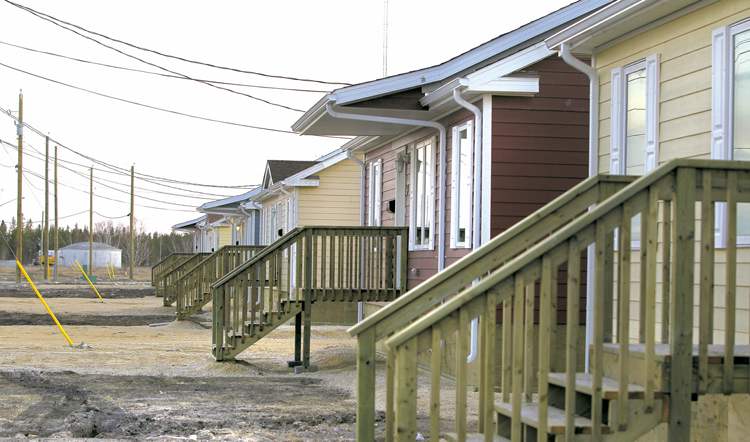New deal for flood evacuees
Feds, province to split reserve relocation cost
Advertisement
Read this article for free:
or
Already have an account? Log in here »
To continue reading, please subscribe:
Monthly Digital Subscription
$1 per week for 24 weeks*
- Enjoy unlimited reading on winnipegfreepress.com
- Read the E-Edition, our digital replica newspaper
- Access News Break, our award-winning app
- Play interactive puzzles
*Billed as $4.00 plus GST every four weeks. After 24 weeks, price increases to the regular rate of $19.00 plus GST every four weeks. Offer available to new and qualified returning subscribers only. Cancel any time.
Monthly Digital Subscription
$4.75/week*
- Enjoy unlimited reading on winnipegfreepress.com
- Read the E-Edition, our digital replica newspaper
- Access News Break, our award-winning app
- Play interactive puzzles
*Billed as $19 plus GST every four weeks. Cancel any time.
To continue reading, please subscribe:
Add Free Press access to your Brandon Sun subscription for only an additional
$1 for the first 4 weeks*
*Your next subscription payment will increase by $1.00 and you will be charged $16.99 plus GST for four weeks. After four weeks, your payment will increase to $23.99 plus GST every four weeks.
Read unlimited articles for free today:
or
Already have an account? Log in here »
Hey there, time traveller!
This article was published 17/04/2013 (4580 days ago), so information in it may no longer be current.
Ottawa and Manitoba have a deal to split the cost of getting homes and a church built on higher ground for First Nations evacuees who lost their homes two years ago.
The $12-million deal offers about 40 families now stranded in hotels and apartments in Winnipeg their best shot at taking back some control of their lives, Manitoba Aboriginal Affairs Minister Eric Robinson said in a phone interview.
All are from Lake Saskatchewan First Nation, which with Lake St. Martin were the worst hit in the 2011 flood.

The first families could be in their own homes as early as this fall. The location will be selected from lots of land owned by the Little Saskatchewan reserve in the Rural Municipality of Grahamdale, Robinson said. The area is located near Gypsumville, 260 kilometres north of Winnipeg.
“We are going to expedite that process and (Aboriginal Affairs and Northern Development) Minister (Bernard) Valcourt was committed on that… We want to make it quick, but whether it’s going to be the end of this summer or early in the fall, that’s what I can’t tell you,” Robinson said.
He said the province agreed to provide 40 homes and a church building. He anticipates the deal will see 200 of the 360 residents of Little Saskatchewan headed home.
With proper drainage to avoid overland flooding, there’s no reason to believe the homes will ever need to be moved again, the minister said.
The houses are to be transferred from the former Gypsumville radar base. They were originally intended for flooded-out residents of Lake St. Martin First Nation, but after several resettlement deals fell apart, they will go to Little Saskatchewan instead.
Nearly 2,000 First Nations evacuees have been stranded in hotels and apartments, mostly in Winnipeg, since the 2011 flood. Evacuees cite higher rates of suicide, alcoholism, drug abuse and chronic illness since leaving home.
In preparation for the move, Little Saskatchewan leaders and the RM of Grahamdale are to negotiate a municipal services agreement on water lines, sewage and other basic infrastructure services.
Little Saskatchewan owns eight parcels of land on higher ground in the flood-prone Interlake, purchased years ago by leaders who anticipated such a move was inevitable.
What’s needed from the RM now is an agreement on the selection of land for the settlement, which can be done now that the two senior levels of government are in agreement with the First Nation, Robinson said.
He said he sat down with Valcourt, chief federal flood representative Sid Dutchak and Little Saskatchewan leaders April 10 at the regional Aboriginal Affairs headquarters in Winnipeg.
Aboriginal Affairs regional spokeswoman Ellen Funk confirmed the meeting and emphasized the deal sets up the groundwork for the next steps.
“We realize this is a difficult situation for those who remain evacuated from their homes. We are committed to working together with the province and the leadership of Little Saskatchewan First Nation to find a long-term solution that will return community members to safe, permanent accommodations,” Funk said.
Ottawa agreed to do a land survey and convert the land to reserve status, which means it will meet the provisions for federal jurisdiction under the Indian Act, the law that governs First Nations in Canada.
In addition to setting up a new reserve for the evacuees, there is work to be done on the existing reserve. It will remain reserve land but is too heavily flood-damaged to be useful. That part of the deal includes federally financed plans for demolition and removal of waterlogged and mouldy homes.
Negotiations still to do on the new parcel include ownership of mineral rights, access and third-party interests along with a community plan to lay out the new housing and large-scale sewer and water projects.
On the same day the Little Saskatchewan deal was inked, Valcourt and Dutchak met with leaders of the Lake St. Martin First Nation, also heavily damaged by the flood two years ago.
“While there is still work to do, we believe we are getting closer to an agreement,” Funk said.
alexandra.paul@freepress.mb.ca

